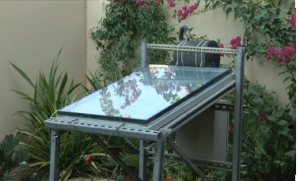
Desolenator, a U.K.-based water desalination start-up, aims to give families in deprived countries the ability to turn salt water and contaminated water into pure drinking water.
Their water desalination unit, expected to cost around $500 USD, uses solar energy to produce some 15 litres of water a day.
The company says the technology has the potential to provide water independence for up to a billion people living in areas where clean water is scarce; using just the power of the sun.
“We foresee markets for this technology in any country around the globe that is suffering fromwater shortage. You can think about countries like Eritrea and Somalia. You can think about Peruand Chile. You can think about the Philippines and many countries in the Middle East,” said Desolenator managing director and inventor William Janssen.
The company plans to initially produce and test 100 units in a village in southern India, which now depends on water truck deliveries, before developing further units.
“India is a country that has a very big water problem. The Indian population is growing very fast and most water sources in India are heavily stressed,” said Janssen.
The company, which needs to raise about $150,000 USD to start the production, will provide the first 100 units for free.
Afterwards financing options will include leasing and microfinance, while assistance could be provided through non-governmental organisations.
Speaking from his home in Abu Dhabi, Janssen said that nearly all domestic water there comes from seawater desalination plants.
These burn large volumes of oil every day to boil and distil seawater.
But the Desolenator device uses both the heat and electric energy of a photovoltaic panel to perform the same task without burning fossil fuels.
The current model of Desolenator is about the size of a flat screen TV and can produce enoughwater for a family of five. The company will launch the first household units in mid-2015.
They then plan to start developing a larger system based on the same technology that will produce 1,000 litres of water per day. (Reuters)







